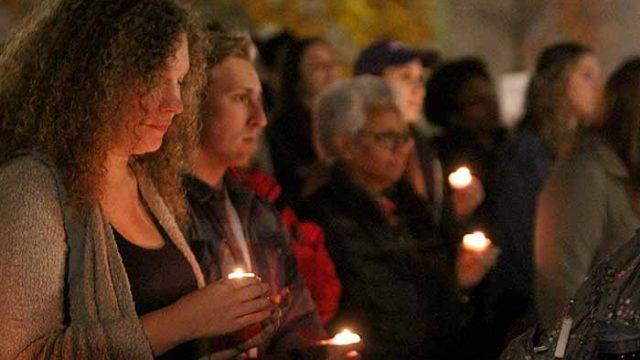Eradicate Boston College Racism announced on Facebook last week that three more members of the group had received sanctions for their involvement in unregistered demonstrations that took place last fall. The first was a “Stand Against Hate” rally on Nov. 14, 2016, and the second demonstration, on Dec. 1, 2016, called for BC to declare itself a sanctuary campus. Four students received sanctions earlier this semester—these three are the last of the seven who received summons to disciplinary hearings.
According to Gloria McGillen, LGSOE ’17, four members of the group received an administrative warning, and three received disciplinary probation. An administrative warning is “an official warning to the student that subsequent violations of the Code of Student Conduct may result in higher level sanctions,” according to the BC Code of Conduct. Disciplinary probation is the lower level of probation in the conduct process—similar violations of the Code of Conduct could result in University probation, loss of privileges, and/or housing suspension.
In December, Eradicate published a screenshot of an email to the Office of the Dean of Students on its Facebook page in which it requested that all of the charges be dropped. It listed the students who received summons to hearings.
Chad Olle, LGSOE ’17; Cedrick-Michael Simmons, a sociology Ph.D. candidate; Sriya Bhattacharyya, LGSOE ’16; and Kimberly Ashby, a counseling psychology Ph.D. candidate, all received summons to conduct hearings. Amelie Daigle, GMCAS ’18; Kevin Ferreira, GLSOE ’19; and Raquel Saenz, GSSW ’17, received requests for conversational hearings.
In a statement provided to The Heights, Dean of Students Thomas Mogan said students’ free expression is important to BC, but it can’t disrupt the business of the University.
“The registration process gives us the opportunity to have conversations with students about actions that may disrupt University operations,” Mogan wrote in an email. “Given the high-profile incidents of violence on college campuses, such as the recent protest at the University of California-Berkeley, the safety of the campus community is of paramount concern. I believe it would be irresponsible for administrators in this day and age not to not take appropriate precautions.”
The sanctions have coincided with a push by members of Eradicate to clarify and make some changes to the University’s free speech policy, which requires that demonstrations be registered with the Office of the Dean of Students.
In response to the sanctions, McGillen and Craig Ford, president of the Graduate Student Association and GMCAS ’21, wrote a report on BC’s free expression climate, compiling several recommendations that will be presented to the Graduate Student Senate and Mogan on Thursday.
Mogan wrote in the statement his office took action because “it became obvious that members of EBCR clearly understood the policy and were consistently ignoring it.” McGillen disputed that statement, saying in an interview that Eradicate had not understood the policy until recently. According to her and Ford’s report, only registered student organizations and individual students can register demonstrations, post and disseminate flyers, or table to advertise events and initiatives.
At the beginning of the year, Eradicate asked to be included as a sponsoring organization in a “Silence is Violence” march held in response to a homophobic slur that appeared on a parking sign in the Mod Lot. The request was denied, which Eradicate later learned was due to its status as an unregistered group, McGillen said.
In a Heights article on the march from Sept. 29, 2016, Mogan confirmed that Eradicate was not included as a sponsor because it is unregistered. McGillen said the policy was not clarified to them until after the first round of sanctions were released earlier this semester.
The report compiled by Ford and McGillen calls for BC to rescind all the disciplinary actions taken against members of Eradicate. It also recommends that BC organize a campus-wide forum on free expression to be held this semester; create and publish a guide to free expression for BC students; and create a Committee on Free Expression at BC. It also advocates for all students to be able to petition the Office of the Dean of Students to register protests, distribute or hang up flyers, or table to promote events or initiatives, among others. If denied, these petitions would be subject to appeal to the committee.
“We want to get this issue resolved so that we can focus on what we’re actually asking for in the demonstrations, the kinds of policy changes we’ve been trying to organize around,” McGillen said.
Featured Image by Julia Hopkins / Heights Editor



















